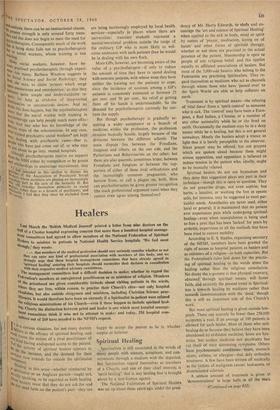The clinics of individual healers are on a much smaller
scale; but taken over a year the number of patients treated at them must far outstrip those attended to at mass demonstrations and at services. By far the best-known clinic is Harry Edwards's; he can hardly see fewer than 2,500 patients—possibly twice this number—in the course of a year, even though he limits his sessions to three days a week. His mail averages 10,000 letters a week—most of them asking for what is called 'absent healing'—which corre- sponds roughly to intercessory prayers. Accord- ing to Edwards's book, Spirit Healing, his patients have included members of the Royal Family and other royal families; Cabinet Ministers, Privy Councillors, peers, MPs, an army commander-in-chief, an archbishop—and doctors.
Divine Healing
Most of the chief religious denominations in this country have developed ministries of healing over the past sixty years. The Church of England was first in the field in modern times with its Guild of Health. Founded in 1901 by the Rev. Percy Dearmer and Canon Harold Anson partly as a counterblast to Christian Science and Spiritualism, it has sought to restore the healing ministry of Christ through his Church, interpret- ing 'Church' in an ecumenical sense. All this activity has called into being a central body, known as the Churches' Council of Heal- ing, originally formed by Archbishop William Temple. This joint body, chaired by the Bishop of Lichfield, includes representatives of the Church of England, the Church of Scotland, the Scottish Episcopalians, the Welsh Presbyterians, the Society of Friends, the Guilds of Healing, the BMA, the Royal Colleges of Physicians, Sur- geons, Obstetricians, and Nurses, the Society of Medical Officers of Health, and the Royal Medico-Psychological Association.
But, there are doubts. Admittedly a partner- Although it remains primarily an Anglican organisation, with the Bishop of Coventry for its president and the Archbishop of Canterbury and many other Anglican diocesan bishops among its supporters, it is also backed by Methodist, Congregational, Presbyterian, Baptist, and Quaker leaders. It celebrates the Anglican ser- vice of Holy Communion once a week at its Queen Anne Street, Wl, headquarters, and there is also a Free Church Communion service once














































 Previous page
Previous page